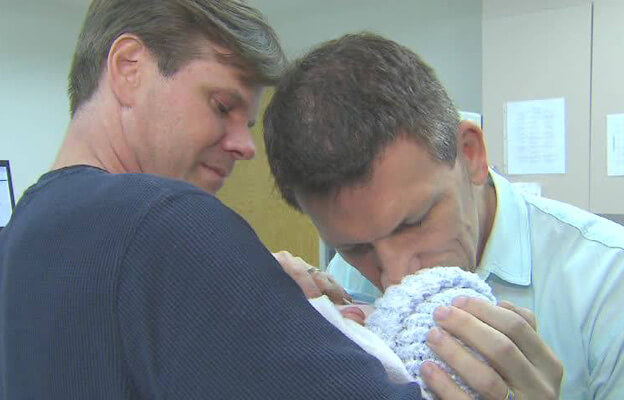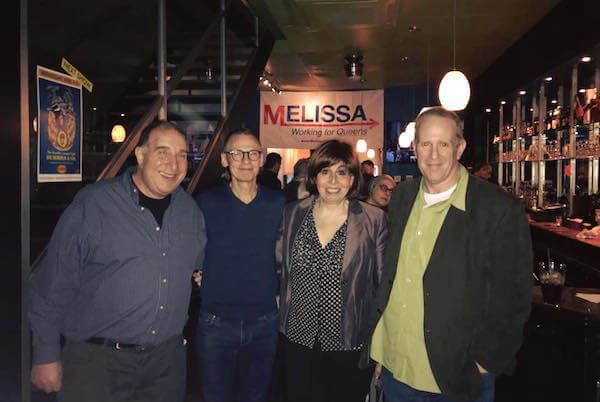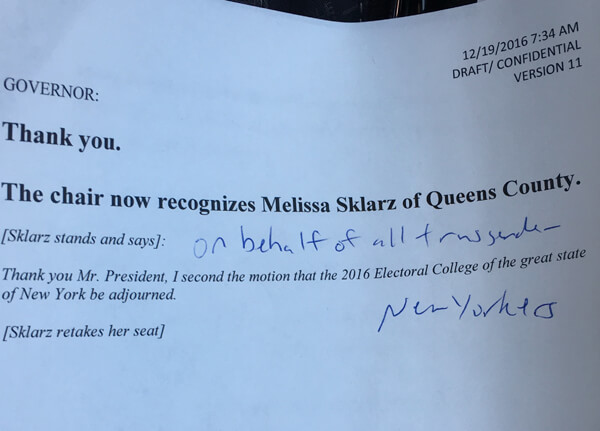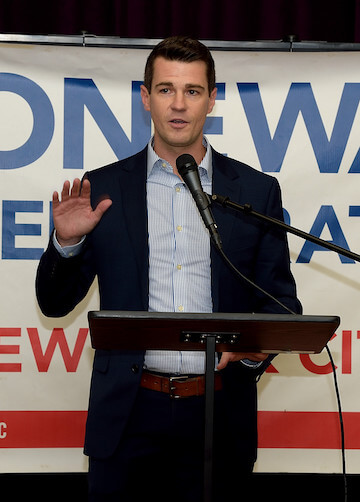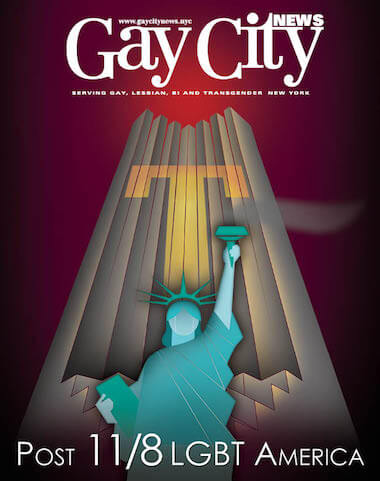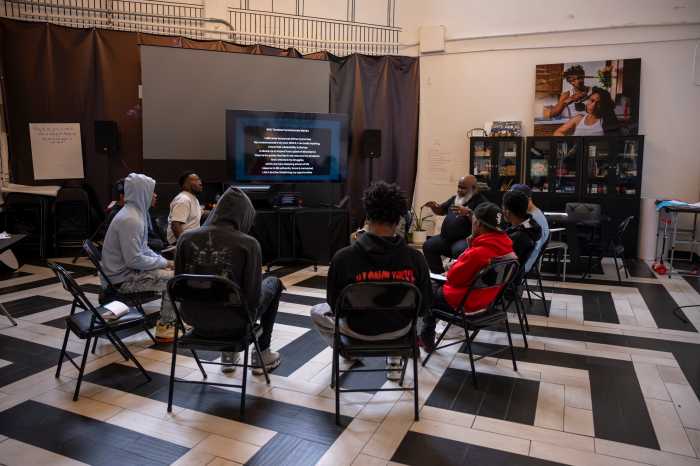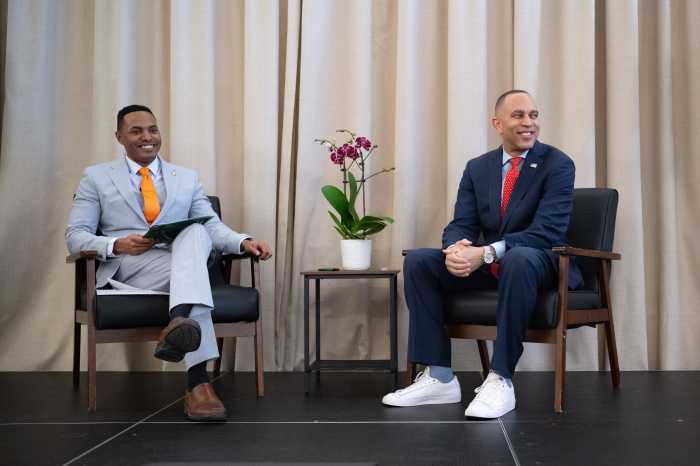Anthony Brown and Gary Spino welcome their son Nicholas. | FACEBOOK.COM
New York finished a more than respectable sixth place in terms of states giving gay and lesbian couples the right to marry, but for gay men who wish to be the biological father to their child, the primary route to doing so — relying on a surrogate mother to carry their child to birth — remains closed to them here at home.
In fact, across the 50 states, New York and New Jersey are among the five most legally restrictive for gay men — or anyone else — taking advantage of the advances in reproductive technology that surrogacy offers.
For the past 15 years, though, Men Having Babies, a New York-based nonprofit group, has worked with gay men here and elsewhere to assist them as they navigate the journey to fatherhood through surrogacy, largely out of state. During that time, demand for surrogacy services has grown dramatically among gay men, but the number of providers of such services that work with the LGBT community has exploded. The result is that costs have come down significantly and access to information and resources has improved.
November 2 conference, expo offer guidance, resources in tackling surrogacy
Men Having Babies is a big part of that changed landscape.
On November 2, the group holds its 10th annual conference and expo, bringing together experts on surrogacy and LGBT families as well as roughly three-dozen service providers, including surrogacy and fertility clinics and attorneys who specialize in family law.
According to Anthony Brown, Men Having Babies’ board chair, the November 2 conference, which will be held at JCC Manhattan, is the largest event in an ongoing schedule of monthly meetings and workshops the group offers in New York for prospective “intended parents” — a legal term of art for the two parents who, in the best case, will be listed on a child’s birth certificate under the terms of a surrogacy contract and the applicable state law.
Under existing New York law, surrogacy contracts are legally unenforceable and, except for specific minor expenses, a woman who carries her own biological child to term or serves as gestational carrier for another woman’s fertilized egg cannot be compensated for giving up parental rights to the child at birth. Brown, who is a family law attorney, said there are such instances of “altruistic” surrogacy, but it is a risky path for intended parents since their legal rights are not secured until after birth.
Out gay Manhattan Senator Brad Hoylman and Westchester County Assemblymember Amy Paulin, both Democrats, have proposed legislation to open up surrogacy rights to New Yorkers but the measure has not yet advanced in Albany. New Jersey does not have the outright ban New York is burdened by, but its case law poses similar barriers to intended parents.
Hoylman and his husband, David Sigal, have a daughter born through surrogacy, and Brown and his husband, Gary Spino, are fathers to Nicholas, born in 2009 with the help of a gestational surrogate. Brown and Spino, whose sperm was used, worked with an egg donor from Florida and a gestational surrogate who lived in North Carolina — a process that had to be structured to comply with the laws of several states. Brown explained that such gestational surrogacy has become more common than “traditional” surrogacy — in which a woman carries her own biological offspring to term — because most instances of a surrogate rethinking and regretting her decision to surrender parental rights involve those who are the biological mother. He emphasized, however, that he and Spino have worked to keep both women involved in Nicholas’ birth a part of the youngster’s life.
According to Brown, the world has changed considerably even since he and Spino became fathers in 2009 — a story that was captured in a Soledad O’Brien special on CNN and in Gay City News’ LGBT Pride issue cover story. He estimated that the total costs incurred — for surrogacy services, hospital expenses, legal fees, and compensation to the surrogate and the donor, not to mention travel — came to $160,000, though without one extraordinary expense typically not incurred the cost would have been $140,000. With the proliferation of providers serving the market of gay intended parents, he said, that has come down to an average of about $110,000, and Brown has seen some full-service providers offering costs as low as $85,000.
That’s still a big hurdle for many prospective parents, and Men Having Babies works to ease the burden on at least some of them. Brown said the group last year distributed about $600,000 in cash and donated services to nine qualified couples or single parents and made provider discounts worth about $1 million available to another 30.
Paying for surrogacy is just one of the topics to be tackled at the November 2 event. Nathan Schaefer, executive director of the Empire State Pride Agenda, and Gabriel Blau, who heads up the Family Equality Council, will address efforts to reform surrogacy law in New York and elsewhere. In an ethics panel, Professor Susan Golombok from the Centre for Family Research at Britain’s University of Cambridge will discuss her research findings on the impact of surrogacy on both children and the surrogates themselves. One of the chief concerns lawmakers often raise when considering reform of family law in this area is guaranteeing that the rights and informed consent of surrogates and egg donors are adequately addressed.
The JCC event will also include a Surrogacy 101 introductory panel, private consultations, and workshops exploring health, legal, and emotional aspects of surrogacy with the participation of fertility service providers, attorneys, and parents and children who have built their families through surrogacy.
The Men Having Babies conference takes place on Sunday, November 2, from 9 a.m. to 7 p.m., at JCC Manhattan, 334 Amsterdam Avenue at 76th Street. Admission is $10 at menhavingbabies.org/ny or $15 at the door.

